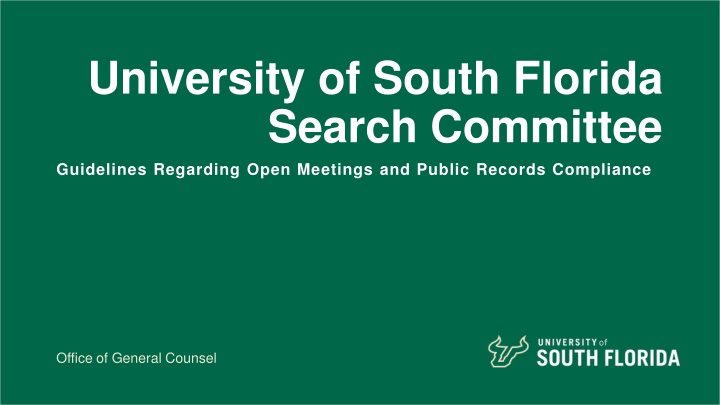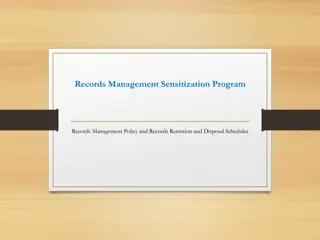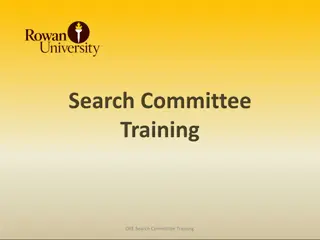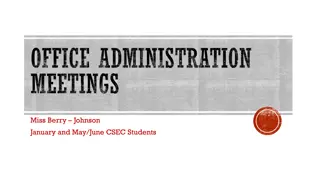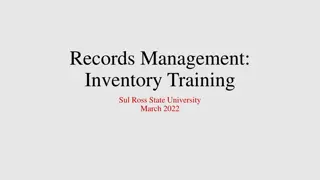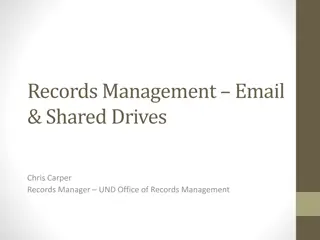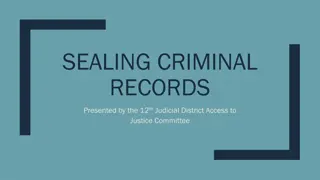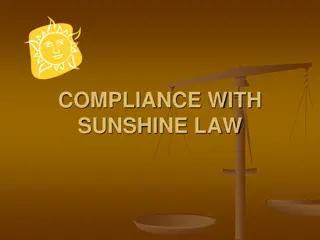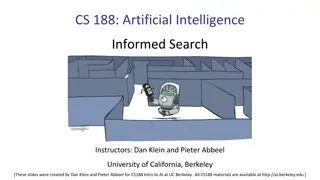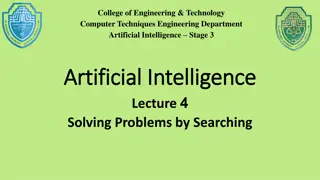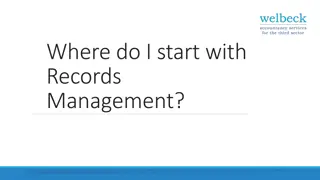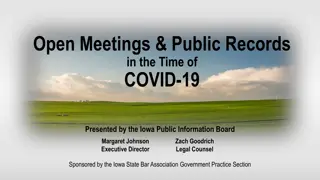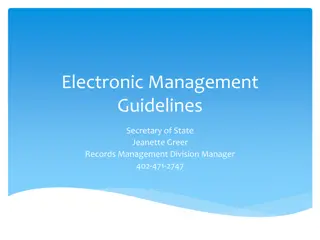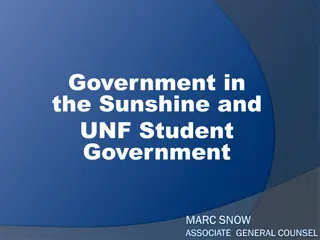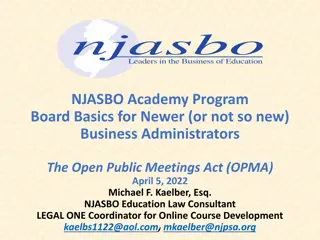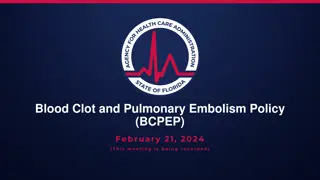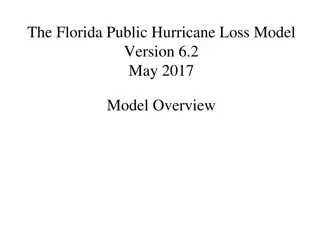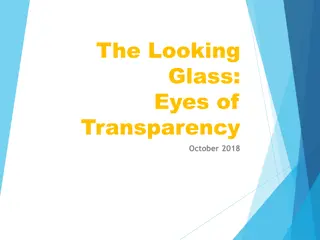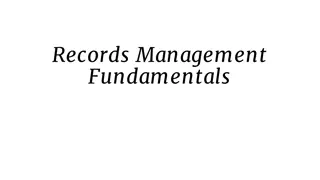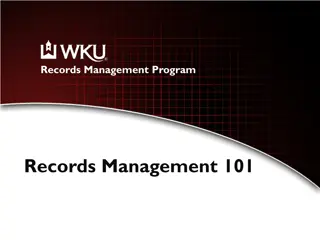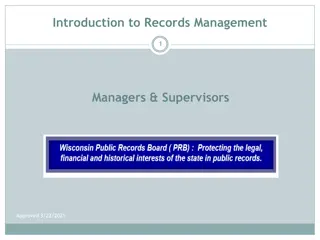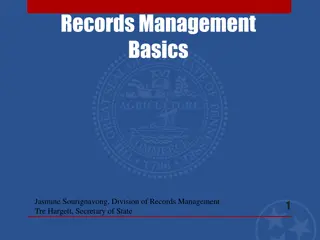Guidelines on Open Meetings and Public Records for University of South Florida Search Committee
The University of South Florida Search Committee must adhere to Florida's open government laws, Chapter 286 Sunshine Law and Chapter 119 Public Records Law. The Sunshine Law requires all committee meetings to be open with reasonable notice and minutes kept. The public must be allowed to attend and observe all discussions, including electronic communications. Meetings must be accessible to all, including virtually.
Download Presentation

Please find below an Image/Link to download the presentation.
The content on the website is provided AS IS for your information and personal use only. It may not be sold, licensed, or shared on other websites without obtaining consent from the author.If you encounter any issues during the download, it is possible that the publisher has removed the file from their server.
You are allowed to download the files provided on this website for personal or commercial use, subject to the condition that they are used lawfully. All files are the property of their respective owners.
The content on the website is provided AS IS for your information and personal use only. It may not be sold, licensed, or shared on other websites without obtaining consent from the author.
E N D
Presentation Transcript
University of South Florida Search Committee Guidelines Regarding Open Meetings and Public Records Compliance Office of General Counsel
Florida Open Government Laws Florida Statutes, Chapter 286, the Open Meetings Law, often referred to as the Sunshine Law protects the public from closed door decision making and provides a right of access to governmental meetings Florida Statutes, Chapter 119, the Public Records Law, creates a right of access to records made or received in connection with official business of a public body
The Sunshine Law Florida Statute Chapter 286 applies to all meetings of any board or commission of any state agency or authority - including University search committees 3 Main Requirements: 1. All meetings of the committee must be open meetings 2. Reasonable notice of meetings must be given 3. Minutes of meetings must be kept
Search Committee Meeting: Open All meetings must be open to allow the public to attend and observe Include any discussions or deliberations, formal or casual, between two or more search committee members about a matter on which the Board/committee might foreseeably take action Include workshops, telephone conversations, e-mail communications, off- campus conversations (even if at a social function or event when committee business is discussed) No use of evasive devices Circulation of written reports Meetings between a committee member and non-committee member being used as liaison between committee members
Search Committee Meeting: Notice Reasonable notice of meetings required Reasonable notice is ample notice given to the public and press which reasonably and timely conveys all information necessary to enable them to choose to attend: Reasonable depends upon situation s circumstances Meeting may not be held at facility/location inaccessible to public or which discriminates regarding admission/accessibility Applies to meetings held virtually
Search Committee Meeting: Minutes Minutes must be recorded and open to public inspection Minutes need not be verbatim--but rather brief summary of meeting s events Sound recordings may be used in addition to written minutes, but if used, must be retained sound recordings are not a standard university practice
Voting Most Search Committees will not include votes However, if there is a vote in a public meeting: Votes must be publicly taken No secret ballots Roll call vote is not required All members must vote (unless they have a conflict of interest which has been disclosed) and the minutes must so reflect by recording of the vote or counting a vote for each member
Penalties for Noncompliance Second degree misdemeanor to knowingly violate Sunshine Law Removal from position Fine of up to $500 Reasonable attorneys fees Declaratory and injunctive relief Action taken at meeting invalid
Public Records Law Florida Statutes Chapter 119 defines Public Records as: All documents, papers, letters, maps, books, tapes, photographs, films, sound recordings, data processing software, or other material Regardless of physical form or means of transmission Made or received pursuant to law in connection with transaction of official business by the agency Not applicable to personal records (e.g. personal notes not communicated to others taken during meetings)
Public Records Law: Highlights Public records law applies to USF records including job applications, letters of interest, correspondence, etc. Applies to all types of records including emails Exemptions redactions Requests can be: Verbal or written Anonymous USF has a reasonable time to respond USF can charge the cost of retrieving records to the requestor that requires the extensive use of IT resources or USF labor If you receive a request, please contact the Office of General Counsel
Public Records Law: What is Not Required Does not require the creation of records or provision of records in the format requested Does not require turning records over on the spot to a requestor Does not require verbal explanation of records
Point person for logistics Sunshine Law applies when using outside search firms Sunshine Law applies to all committee meetings Public Records Law applies to all records maintained by the USF Search Committee Contact: Office of General Counsel, usfpr@usf.edu Summary
What happens if someone from the committee is unable to make a meeting or an interview? Are they removed as committee members?
As a committee member, do I HAVE to turn in interview notes?
If meetings and interviews are virtual (via Teams for instance), when adding to the USF calendar, are we do insert the direct link to the meeting as well? Since they are public? Or should we just add our email if someone needs the link?
What happens if a committee member knows a candidate (previous colleague vs. personal acquaintance)?
Who can you (search committee members) talk to during a search? If a search committee member talks to an applicant, how should that be handled?
What are things that can be discussed during a search between members, versus what must be discussed during a meeting?
What are some of the best ways for advertising to insure a diverse pool? What is best practice if your applicant pool is not diverse?
Are candidate interviews considered public meetings?
What is protocol if someone doesnt want their interview made public (announced, open to public, etc.)?
